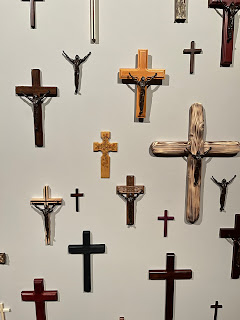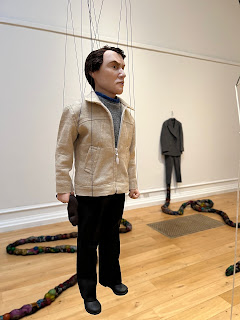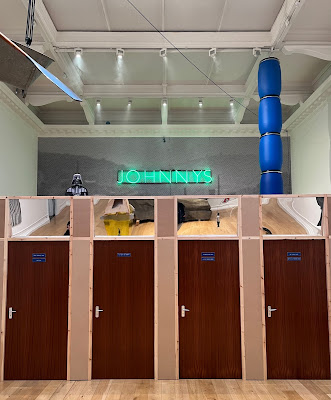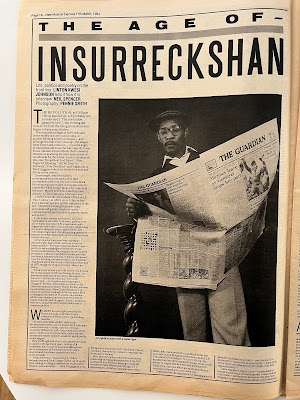 |
| 'The Big Sexy Festy Party' |
My diary note: 'We met outside the dub and roots tent. The sound systems were arranged in a line along one side of the park, ranging from a stage with punk bands, through various house and techno line ups, a drum & bass system and a more eclectic tent which seemed to be playing everything from Stevie Wonder to sort of Latin Jazz (the DJ was wearing a huge sombrero). With so much in such a relatively close space it was possible to listen to several sounds at once depending on where you were standing. We took kids dancing on our shoulders at the Big Sexy Festy Party sound system. The crowd wasn't as big as last year's in Finsburty Park, but it was nice and relaxed in the sunshine. At one end of the site were circus performers. There was a trapeze and stilts, but not much action while we were there, although four women in white dresses and silver foil angel wings emerged and ran into the dancing throng and there was also a giant robot marching around on stilts'


'Staging a free festival is riddled with obstacles and bureaucracy - but these hassles pale into insignificance when we're dancing. And today we are dancing strong to show our unison against such infringements of our rights to gather, assemble, protest, dance and move on'
There were stalls there from various groups including Reclaim the Streets, Justice (Brighton anti-Criminal Justice Act group), Squall (squatting/counter culture paper), Friends and Families of Travellers and the Free Tibet Campaign.
Kai Sounds ran the dub stage, with Jah Free from Southend, the Bushchemists, the Disciples and a Zion Train DJ set.
There was also a free party sound system stage, as explained in the programme:
'Hello, hello and welcome to the show This is the all England Free Party Stage comin' at ya loud and proud, courtesy of the Big Sexy Festy Party and the International Free Festival of Global Rights, 1997. Hosted this year by the South West's smiling groove posse Sunnyside and Nottingham's ever legendary DIY bringing you just a small but excellent sample of the UK's funkiest free party culture.
In every region of this country just about every weekend of the year, groups of people commonly assent to gather together with one unifying purpose to dance for free in woods and fields, warehouses and factories, barns, farms, quarries, squats, forests and beaches. just about anywhere. In fact these events defend an age old inclination by mankind to assemble, celebrate and interact as a community in a
spirit of care, responsibility and joy.
In an era which has seen a huge erosion of our human and civil rights and the hard sell of practically every conceivable aspect of modern existenve they provide a valuable and democratic
antidote for the spirit in the face of crass cultural commercialisation. In a society where everything is potential product, priced and marketed for those who can afford it, something for free sets a
dangerous precedent for those in economic and political power,
This stage is dedicated to all those many groups and individuals who tirelessly provide their energy and resources in order to preserve these principles. The biggest of shouts goes out to free party heads everywhere; to Bedlam, Circus Warp, Smokescreen, Desert Storm, Lazy House, Disc-Lexia, Chilholm Tribe, Freebase, Fun Factory, Sacred Grooves, Discord, Slack, BWPT, Stroudoss, Mutant Dance, Vibe Positive Sounds, Pulse, Rogue, Spoof, Fluffy as Fuck, TWAT, Toe-to-Head, Pineapple Tribe, Exodus, Chiba City, Misdemeanor, Indigenous Sounds, 55 Trout, Immersion, Trolley Sound System and all those who shall remain nameless for risking liberty, property and land in the name of freedom .
Enter, enjoy, think then act. Do it and remember, always make a donation, support
your local underground'

 |
| Daniel Poole glow in the dark robot t-shirt! |
See also:




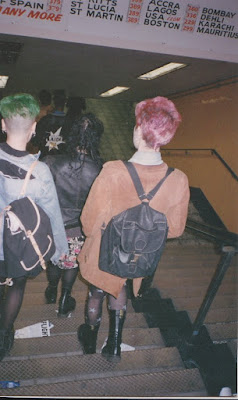
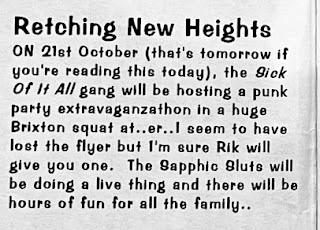


.jpg)




